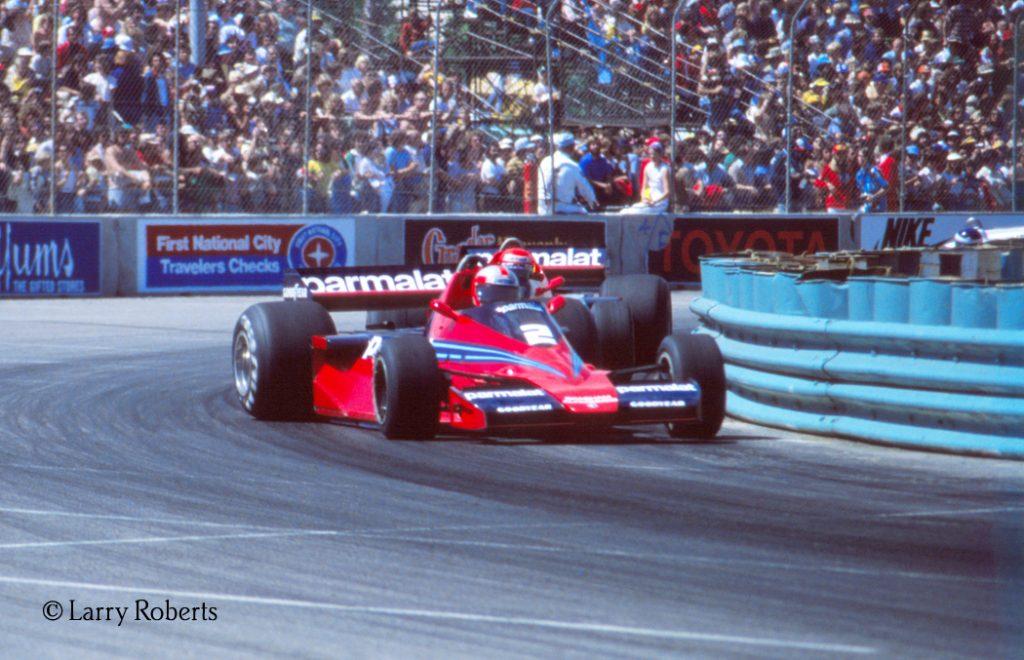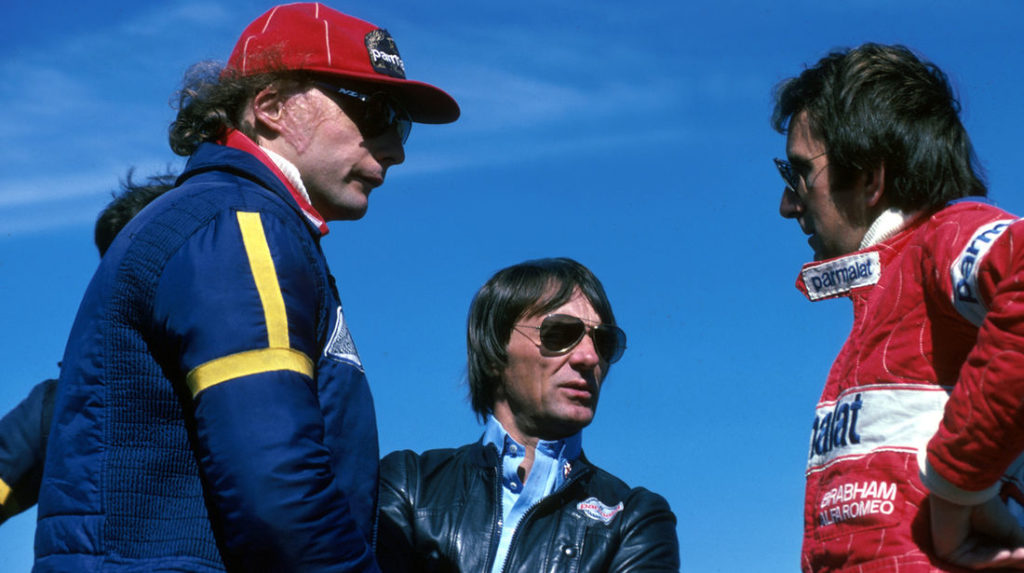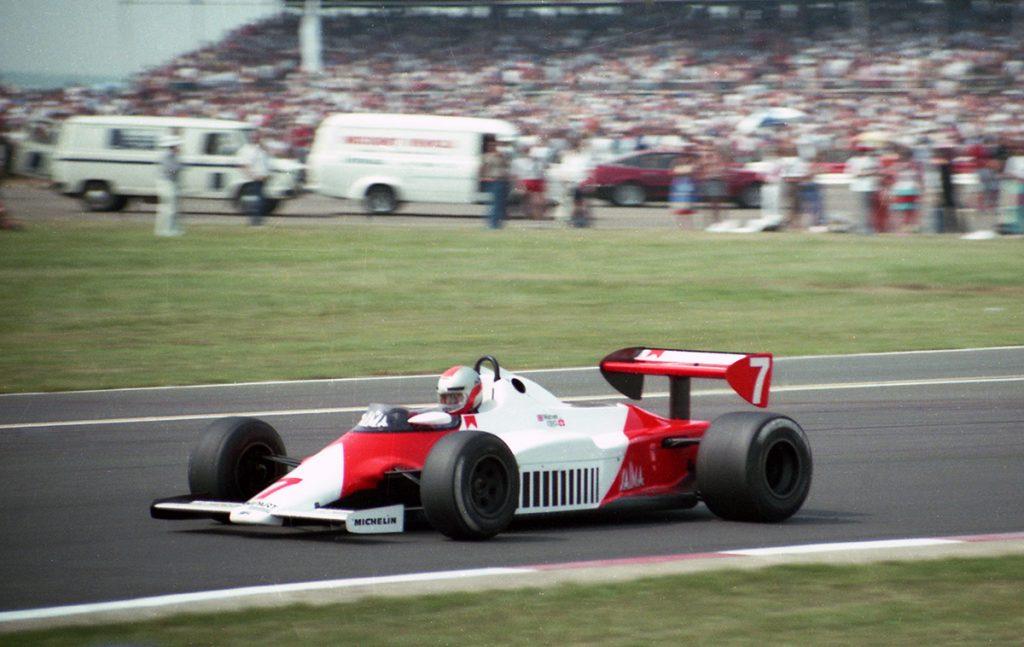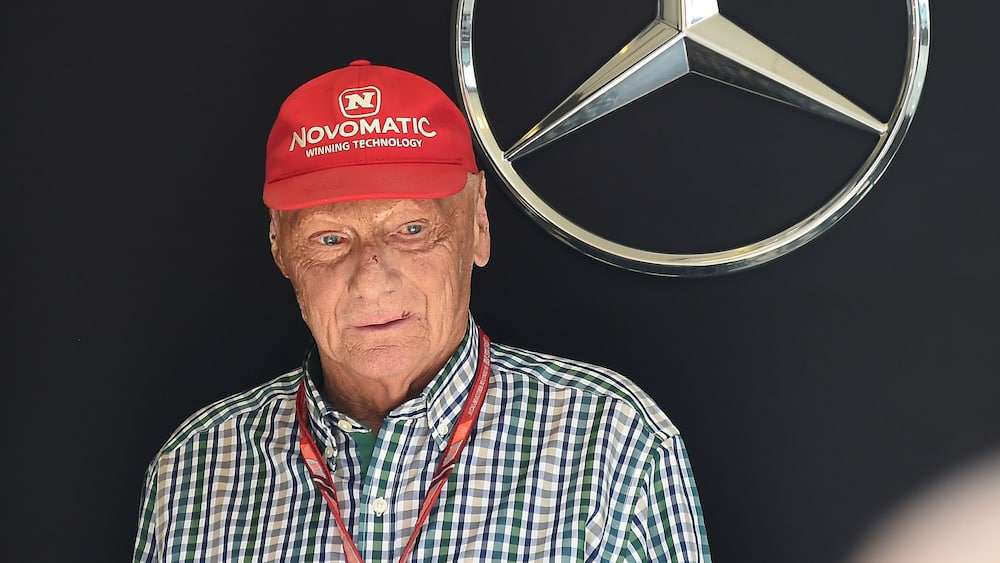
John Watson, a 5-time Grand Prix winner, was the teammate of Niki Lauda at Brabham in 1978 and McLaren in 1982/83. Károly Méhes spoke exclusively with Watson one week after the funeral of the 3-time World Champion Niki Lauda, who died at the age of 70 on May 20.
Main image © Larry Roberts. Text editing by Andrew Balfour.
Let’s start with 1976, the German Grand Prix. You were beside Niki after he was pulled out of his Ferrari, talking to him. How do you remember this?
It was a very unpleasant scene. This was a major accident. Niki’s condition was severe, he was badly burned on the side of his face and his forehead. These injuries were visual. But we did not know at that time that the bigger problem were the fumes he had inhaled. All I could see were the burns.
Did you communicate with him at the scene?
Yes, he asked me what his face looked like and my response was, “you are OK, you are fine, don’t worry. The ambulance is coming, you will be taken to the hospital and you will get treatment.”

Switching to 1977, after the tragic death of Carlos Pace, you were clear Nr.1 at Brabham-Alfa. When did you learn that Niki would switch to the team from Ferrari? Did Bernie Ecclestone discuss the matter with you?
Yes, he did. Bernie Ecclestone asked me at the German Grand Prix how I would feel if Niki joined the team. I said I had no problem. I wanted a guarantee of receiving equal treatment on the car; every part, including the setup. Bernie said this was no problem at all.
No fear of the double World Champion beside you?
I had no problem driving against anybody. The area where I was probably a little bit naïve, was in understanding how you become a double World Champion in the end. The skill Niki had outside of a racing car I had never seen and experienced before. And on top of being double World Champion when he came to Brabham he brought along his personal sponsor as the title sponsor of the team, Parmalat. He came as a double World Champion, fine, no problem with that, but he also brought the principal sponsor. It gave him a stronger position within the team for that reason alone.
Remember that Niki was an astute, clever guy. He knew the value he was bringing and how to shape a team around himself. And this is part of what being a successful racing driver is about. The truth is, races and championships are won more when you are out of the car than when you are in the car. Niki had this experience and used it to his benefit.
How did you get on as teammates at Brabham in 1978?
I liked Niki a lot. I liked him as a person, I liked his humour, he was a smart and intelligent guy. He was somebody I enjoyed the company of. Some people in motor racing you got on very well with; some people you don’t get on so well. Niki was one of those people who I liked a lot.
The BT46 was not as competitive as its predecessor, yet one weekend stays in the mind; the solitary victory of the “fan car” at the 1978 Swedish Grand Prix. Should it have been your win?
I qualified ahead of Niki in Sweden. The fan car was Brabham’s answer to the Lotus 79. Brabham couldn’t make a ground effect car due to the configuration of the Alfa Romeo engine. Gordon Murray came up with the concept of the fan car. It was successful in Anderstorp, but caused massive problems with all the other teams. Bernie Ecclestone said, “Look, my car conforms with the regulations, let me race it. Then I will remove the fan and make it the normal BT46 again.” We ran the fan car, Niki won the race. I tried to pass Patrese, made an error, got shit in the fan and my race was ruined.
You knew before the race that it was a one-off weekend?
From the political side, it was something that Bernie negotiated with the other team principals. All we were asked to do was to win the race. I don’t know the whole process, but it was made clear that we would have the normal car after Anderstorp. This was a decision made by Bernie. It wasn’t banned in the sense what people sometimes believe. Bernie did this because he realized that the fan car risked helping to break up FOCA. He saw that the future of Formula 1 as a strong unified group of teams was a more important goal than going alone as they had done for many years.
Your paths separated in 1979 when you moved to McLaren. What did you think of Niki’s sudden retirement in Montreal 1979 and did you expect him to return one day?
First of all, it was a surprise, because there had been nothing to suggest he was going to take this step. I don’t know why he choose to do it in the middle of the Grand Prix weekend, towards at the end of the year. May be got out of his bed on the wrong side that morning. Niki made his decisions and stood by them, just like in Japan 1976 [when he retired from the race due to the terrible monsoon-like conditions, handing the championship to James Hunt]. He made his mind up and stuck with the decision.
You were coming into your fourth season with McLaren in 1982 when Lauda appeared again as your old-new teammate. What kind of feelings did you have on his return?
The idea of him coming back came up in August or September 1981. I wasn’t aware of any ongoing discussions with McLaren or Marlboro much before this period. Then he did the test in Donington Park. The questions that had to be answered were a) did he really want to do it, and b) can he still do it competitively. After 2.5 years out of F1, the cars were different – even if they still had ground effects. Niki did the test, went away, and realized he needed to return to training, to get fit again. He still said yes. They negotiated a contract which had a 3-race break clause. If after 3 races either party said let’s forget it… but Niki won his third race at Long Beach and there was no way he was not going to continue.

Were you surprised that he was immediately competitive?
Not really because this was part of the man. If he made up his mind to do something, he would do it to win. His Austrian trainer Willi Dungl helped him to get into condition to become a Grand Prix driver again. And you also have the Lauda logic. Put all these together and you have a perfect Grand Prix driver again.
What was difference between the Lauda of 1978 and 1982?
I think it was mostly down to the different dynamic between driving for Brabham and McLaren. It was almost a love affair when he came back and won his third race but Niki finally realized that, unlike Brabham where he had significant influence, he had been hired by Ron Dennis to win for the team.
Niki was a member of the team, he did a good job. I did a good job as well. At the end of the year when we went to Las Vegas, I was in a better position to win the championship than Niki. I remember that Saturday night Ron spoke to Niki and explained this to him and said, “Look, John is better placed and if he is quicker and you’re ahead in the race let him go, let him pass. Niki had never been asked this before. This is the point he realized that he didn’t have the strength he thought he did at McLaren.
All Ron Dennis wanted was for the team to win. It was all about the team, not the driver or any individual. All Ron Dennis wanted was for the McLaren to win the World Championship.
McLaren was nowhere in 1983, but the USA West GP turned out to be a real hit for the team and for you personally. Tell us more.
Well, the problem we had in Long Beach, and we had later in Monte Carlo, was that we couldn’t get the qualifying tires to operate in the proper technical range. We couldn’t get the car to work. In the race, with full tanks and race tires, everything returned to normal. The car was very good in the race. Every time Lauda passed a car, I made sure I got through at the same time. We went forward car by car by car. Then he was leading and I was second. Then I made a strong move with late braking, but I made it. I took the lead and pulled away comfortably.
You still hold the record for winning from the lowest grid position! You must be very proud.
[Laughing] No, I don’t think about to be honest! Never think about it.
In 1985, you had the chance to drive Niki’s McLaren at Brands Hatch with the Nr.1 on your nosecone. How did this come about?
That’s correct. Niki had some minor injury or something. I was asked to drive the car. I said yes, I was very happy to drive the car. McLaren arranged two or three days of testing at Donington Park. I had no problems driving the car but I had to relearn the art of overtaking. I had some problems with braking points. I finished seventh, which was disappointing. Alain finished fourth and went on to win the championship.

What about Lauda’s career at Mercedes?
As far as I know, he was directed towards Mercedes by Bernie Ecclestone. I think Bernie had some influence. He told the Mercedes people they should bring Niki in and use his skill. But not before 2012/13 when he became Non-Executive Director. The work done by Ross Brawn between 2010-2013 in preparation for 2014 meant that Mercedes had by far the most competitive car and they had two outstanding drivers, particularly Lewis Hamilton – so it wasn’t difficult them to win races and championships. For sure Niki had a lot of experience and sense as well, especially from the driver’s side. Maybe he was able to apply his Lauda logic in some situations. Niki was quite good at looking through the bullshit in motorsport. Niki had fundamental logic and the ability to see through a problem to find the result he wanted.
How did you feel when you heard of Niki’s passing?
Very sad on many levels. First of all because he has a family with young children. For them it is a very big loss. On a personal level, I will miss having someone to talk to that I really like on the few occasions I visit a race these days. I really liked the guy. I enjoyed seeing him, I enjoyed talking to him. He was good company. Niki packed as much into life as anybody could do.





